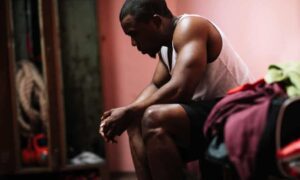
It was a few days before my 21st birthday in 2017 when my mother pointed out a small lump on my chest. I was weightlifting at the time and often walked around the house shirtless. Three weeks later, the lump had doubled in size. I went to a hospital, where a doctor diagnosed gynecomastia, a benign condition where an imbalance between the hormones testosterone and oestrogen causes an overdevelopment of breast tissues.
The irony was not lost on me: I was weightlifting because I aspired to the kind of masculinity typified by a chiseled chest and bulky muscles, but instead I had acquired a distinctly feminine trait.
The doctor assured me that it was common, although typically occurring in newborns, teenagers and men over 50. He promised it would clear up in time. It did not, and by the following year, when I started studying at Lagos State University, it had become embarrassing.
In Nigeria, where I live, a man having feminine qualities opens you to ridicule and even physical harm. Many associate “unmanliness” with homosexuality, which is illegal.
I altered my lifestyle radically. I wore loose-fitting clothes made of heavy cloth, even in hot weather. In my second year, I started wearing a binder that made my chest hurt.
I avoided activities and places such as swimming pools, where I had to be bare-chested or in the spotlight. I passed up the chance to play in my university football team and avoided giving class presentations. Not once during our six-month relationship did my girlfriend see me bare-chested. I shared an apartment with two other male students and grew a reputation for being the only person they knew who dressed in the bathroom.
